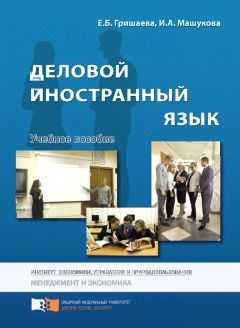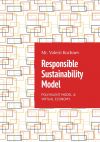Текст книги "Деловой иностранный язык"

Автор книги: Ирина Машукова
Жанр: Учебная литература, Детские книги
сообщить о неприемлемом содержимом
Текущая страница: 5 (всего у книги 15 страниц) [доступный отрывок для чтения: 5 страниц]
Module 2
Unit 1. Recruitment
Learning outcomes
▪ Understand the recruiting/employing process
▪ Learn how to look impressive during interview
▪ Learn how to be successful along the road of your career
▪ Participate in discussions and role plays on the problems of employment using your personal experience
▪ Master your skills in writing a summary
Task 1. Reading 1
Getting started
Before reading the text, think of the last interview you attended and discuss in pairs the following questions:
▪ what was the worst thing about it?
▪ what difficult questions were you asked?
▪ why do you think you were successful, or unsuccessful?
▪ if you could go through the interview again, what would you do differently?
▪ in the interview, do you always have to be completely honest?
▪ what impression do you try to give an interviewer?
Some interviews give candidates a hard time by asking them difficult questions. Read the text, consult Vocabulary p. 150–151. Discuss these points:
▪ Can you think of questions you might be asked at an interview?
▪ What would you feel at each stage of the interview?
▪ How would you feel at each stage of the interview?
ACE THAT JOB INTERVIEW
by Joan Rigdog
WHAT you say is important, but HOW you say is crucial
Job interviews are a minefield. Your prospective employers have a stack of resumes from talented applicants. Now they want to know what makes you tick. Are you hard to get along with? Can you meet deadlines? How badly do you want the job?
Many excellent people have missed out on jobs because of a single faux pas during an interview. Gerard Roche, chairman of an executive-recruiting firm, recalls one candidate who failed because his socks sagged. Another made himself too comfortable while being interviewed. "He peppered his conversation with profanities, pulled his chair right up to my desk, and started picking up and examining papers and knick-knacks," says another executive recruiter, Nina Proct.
There's no sure-fire trick for navigating an interview. But you can increase your odds by knowing what you are up against.
Here some of the toughest interviewers reveal the most frequent questions they put to prospective employees – and suggest how you might handle them:
1. What exactly do you want from us? Describe your ideal job.
Many people dodge these types of questions by giving a generic, safe answer. To make a better impression, Dee Soder, an executive coach, suggests that you prepare by writing an "employment ad" that describes your dream job. Include a "headline" and several adjectives outlining the job, the company and yourself. This forces you to focus on exactly what you want and what you have to offer even if the interviewer doesn't ask you.
2. Why did you leave your last job?
Deep down, interviewers know many people leave jobs because they hate their boss: they may have job-hopped for the same reason themselves. But few employers want to hear it. "I don't know why someone who wanted me to hire him would say he had a clash with a boss," says Mike Leavell, a vice president of Hewlett-Packard Company. "That always puts up a big red flag."
Many interviewers suggest that people concentrate on the business reasons for joining a new company. For example: "After two years running the marketing department at company X, I've learned a lot about Y. Now I want to learn Z." Or, "I'm at the stage in my career where I want to add X to my background, and your company is the leader in that field." If you were fired because of a conflict with a boss, however, you may be better off telling interviewers yourself, rather than having them rely on industry gossip. Be diplomatic and positive. Millington McCoy, managing director of an executive search firm, says one candidate gave this type of response: "There was a new chief financial officer, and our management styles were very different. We agreed to disagree."
3. Why are you switching careers?
In this question, interviewers are looking for careful self-analysis. "Don't say I want to try something new,'" advises recruiter Howard Nitschke. "That makes me think: This person doesn't know where he's going."
Instead, explain how your skills, personality and goals are more suited to the new career, or that you want to "add" something to your experience that will help you achieve a longer-term goal.
4. Where do you want to be five years from now?
The best way to botch this one is not to have an answer, or to have an answer that's inconsistent with the company's own goals. But you can also alarm your interviewer by giving the impression that the job is merely "a way station," says Fred Benson, a senior company executive. An organisation may fear that, if hired, such a candidate would spend more time jockeying for the next position than working.
Benson suggests that candidates should make long-term goals part of their answer but to focus on the short term. For instance: "I'm 30 and I love what I'm doing. Ultimately I would like to be a chief executive officer, but I realise I have other things to learn first. The next logical step is to be a division manager. Here's why I think I'll be ready for that in five years' time …"
5. What's your greatest accomplishment?
Susan Gauff, a senior director of marketing and corporate communications, says many candidates fail with this question. Their most common mistake: responding with responsibilities rather than results. A poor candidate for an advertising director’s job will say of a triumphal project, "I wrote copy and supervised photography and proofread the layouts," Gauff observes. The better candidate will say, "First we looked at the strategy of the company. Then we researched the audience and determined what kind of payback we could achieve…"
This answer "describes the big picture, not just the activities," says Gauff. "You don't find many candidates who can do that."
6. What are your strengths?
Since you may be asked to name as many weaknesses, limit yourself to three concrete examples of strengths, again showing benefits to the company.
Millington McCoy asks a tough variation of this question, telling candidates to rank various skills on a scale of one to ten and explain why they rate higher in one category than another. A good explanation reflects on past accomplishments: "I have always done a better job in finding ways to cut costs than of drumming up new business."
7. What are your weaknesses?
Many candidates try to highlight vague weaknesses that can be viewed as assets. They say "I'm impatient," hoping the interviewer will see this as a tough attitude. Or, "I work such long hours that my family life is out of balance."
Don't try it. Interviewers are sick of hearing these stock answers so it won't help your chances.
Instead, be honest, but emphasise the actions you have taken to deal with a weakness. Soder recommends that you use this type of answer: "Sometimes I would push back deadlines to turn in higher-quality work. However, I've learned to delegate more, and have slipped only once in the past year."
Beware: some interviewers fall silent during this question, letting a nervous candidate fill in the void by volunteering more information. Nitschke remembers a candidate who made the mistake of answering this question eight times, talking himself out of the job. Once you've stated one or two weaknesses and their solutions, stop talking.
8. What about a time when you failed?
McCoy says the best answer has this theme: "I fell off my horse. I learned what I did wrong. I got back up and rode it better."
The worst answer is: "I suppose I've been lucky. I haven't failed yet." When candidates say this, "Either they are not telling the truth or they are not trying hard enough," says Ronald Davenport, chairman of a broadcasting company.
9. Will you get along with your potential boss?
Some interviewers recommend dodging this question. Roche suggests saying "I concentrate on the job and the results, and I'm flexible enough to work with almost anyone." If the question is more explicit, such as "Describe the worst boss you worked for," couch your answer as a disagreement over a business issue or as a difference in style – not as a personal dislike.
10. How old are you? How's your health? Are you married? Any children?
Employers can't legally ask these questions. But if an interviewer does ask one of them, don't cry foul unless you don't want the job. "Try to understand where the person is coming from," says Gauff. Chances are the interviewer is really asking how much you're willing to travel or work overtime.
During an interview, a chief executive once asked Gauff whether her husband allowed her to travel. "I did a double take," she recalls. "Then I smiled and said, if you're asking if I'm able to travel on this job, the answer is yes.'" Later, Gauff told the company's human-resources director about the remark. This didn't sink her chances, though; she got the job.
Remember, most interviewers care less about what you say than how you say it. Blunders, outside the formal "interview", are counted too. Roche recalls one candidate for chief executive officer of a telecommunications company who was flown to his interview in the corporate jet. Chatting to the pilot, he made disparaging remarks about the aircraft. “The next guy to fly was the chairman,” Roche says. “The pilot asked him, 'Who was that jackass?” The candidate wasn't hired.
At an interview lunch, don't order the cheapest thing on the menu, even if it's what you want, counsels Leslie Schinto, an external communications director. "They may not take you seriously or pay you enough." But don't make the opposite mistake, either. "A candidate at a dinner interview ordered a steak," recalls Patricia Hoffmeir of a health-care recruiting firm. "After he ate the steak, he said he was sorry he hadn't ordered surf-and-turf. So he summoned the waiter and ordered a lobster as well!" But at least he didn't do what executive recruiter Richard Slayton recalls of a candidate: "When the dinner was over, he asked for a doggie bag."
It is possible to recover from an honest faux pas. When Benson applied for a government fellowship, he took a red-eye flight from overseas to make his interview on time. Walking bleary-eyed into the room, he was blinded by the sun glinting off a glass table and could make out only the silhouettes of the panellists. Extending his hand to the chairman, he knocked a pitcher of water into the man's lap.
In that instant he gave up all hope of getting the position. "I have a feeling that I have nowhere to go but up from here, so I'm going to be very relaxed in this interview," he told the panel. He was – and got the job. Now he helps interview finalists for the fellowships.
From: Reader’s Digest (Australia). 1995–July, – P. 91– 96.
Task 2. Comprehension 1
Say whether the following statements are true or false and prove your point of view according to the text:
1. Everything can play a trick at job interview.
2. When you are interviewed talk about your dream job.
3. If you had conflicts at your previous job or disliked your boss, tell honestly about it at the interview.
4. If you switch the jobs, tell that you like to try something new.
5. It is better to concentrate on short-term goals than on long-term ones.
6. Talk only about your strengths.
7. If you tell about your weaknesses do not talk too much about them, one or two would be enough.
8. Better to describe some aspects of business you dealt with than your relationships with a boss.
9. Never answer personal questions.
10. Your behaviour and manner to talk is even more important than what you say.
Task 3. Vocabulary 1
The following verbs can all be used before the countable noun ‘job’ :
get, look for, apply for, go for an interview for
A Put the verbs in the table below depending on the order they normally occur in. The first one has been done for you.

B Which of the nouns below is not normally used after the verb ‘to earn’?
a high salary
a competition
a weekly wage
a lot of money
a good living
C Match the expressions with the word ‘work’ (1–6) with the definitions (a– f):

Task 4. Vocabulary 2
Match the words and expressions listed below (a–p) with the definitions 1– 13:

1. A date or time by which you have to do or complete something.
2. A very broad concept which means the activity of trying to sell a company’s product by advertising, using attractive packages etc.
3. Probability: how likely it is that something will or will not happen.
4. If two people or groups of people disagree, they argue because their opinions and beliefs are very different.
5. Someone who has formally asked for a job, university place etc.
6. Something that gives you advantages or improves your life in some way.
7. A word that describes a whole class of things (belonging to or a typical of a GENUS).
8. A piece of work, job that has been badly or carelessly done.
9. To be planned to happen in the future; an important and carefully planned piece of work, that is intended to build or produce something new, or to deal with a problem.
10. To be a frequent job-quitter.
11. To avoid considering or discussing something that needs to be dealt with.
12. To find new people to work in a company, join an organisation, do a job.
13. Likely to do a particular thing or to achieve a particular position; likely to happen.
14. If something bad that has happened is someone’s fault; to make a mistake or fail to do something.
15. The act or skill of directing and organising the work of a company or organisation.
16. To give someone instruction in what they should say or do in a particular situation.
Task 5. Talking Point 1
Discuss the following questions in pairs:
▪ How could you explain the title of the article?
▪ Why does the author compare job interviews with a minefield? Can you see what he means?
▪ Is it a reasonable intention to draw different examples for showing so called faux pas of those applicants who failed?
▪ Do you consider the given questions as the easy ones to deal with while being interviewed? Why/why not?
▪ Could you comment on the given advice how to get a position? Is it worth following? Which cases do you consider to focus on and why? Support your argument.
▪ Could you share your personal experience of going through an interview?
Do you know how to succeed at the interview and to be tick?
Task 6. Reading 2
Getting started
▪ Some people think that if they stay at work from 8 to 5, it guarantees them a job for life. And what do you think about it? Is it enough for your successful career?
▪ Which things must be really crucial for anyone who is interested in climbing career ladder?
▪ Work in small groups and think of the ways to win at work.
▪ While reading the text, pay attention to the words in bold and try to explain them.
▪ Read the article of Tom Peters and his ideas about the ways to be successful at work. Consult Vocabulary p. 151–152. Are your ideas similar to those in the article?
WAYS TO WIN AT WORK
by Tom Peters
A management consultant tells how to ride the road to career success
My dad worked at an electric company for 41 years. He was pretty sure, from one year to the next, where he'd be going every morning. But showing up on time and clearing your in tray by 5 p.m. no longer guarantees you a job for life. Today's employees can expect to have to change jobs a number of times and take more responsibility for their success. The new three Rs of the career world are resume, Rolodex and reputation.
You are as good as the skills and results you can confidently brag about (resume) the contacts you maintain in your professional life (Rolodex) and the individuals who swear by your work (reputation).
Here are ten ways to keep your resume strong and your Rolodex full and power your reputation and career along the road to success.
1. Remind people how much you've done for them. One corrugated-box manufacturer hasn't missed a deadline in recent memory. So for the past ten years, the boss has added a note to the monthly invoice, listing date requested, date delivered and the difference between the two. With this little reminder of sterling on-time performance, business jumped. Done subtly, self-promotion is a potent tool.
2. Give others credit. Some people act as if recognising the contributions of others will somehow diminish themselves. Yet, giving credit costs you nothing. Truth is, that guy who six months ago casually mentioned, «Mary, pogo sticks are due for a comeback,» thinks he is responsible for the killing you later made in bongo drums. In his mind he gave you the critical clue at the right moment. So, give him credit! First, he has a point; but mostly, you gain goodwill.
3. Don't forget thank you notes! Years ago I worked for a boss who was tough and proud of it. But every evening he would write 15 brief thank you notes. («George, what was a terrific idea you had. Hope you follow up on it. Walt.») He had people eating out of his hand. Positive reinforcement goes a long way; most people don't give, or get, enough of it.
4. Accumulate the small wins. Call them favours owed; chits in the bank, but small wins are a large plus. In a speech to newspaper publishers last year, I criticised a newspaper for not getting its product to me early enough. The next morning my paper arrived at 5.05. The publisher had heard my talk and had taken time to deal with my complaint. No matter what the paper does to me in the future, that rooster-hour delivery will stay in my memory.
5. Search out hidden levers. Power often lies in the details, and the tenacious pursuit of such hidden levers can pay off enormously. While you don't want to get a reputation as a prissy worrywart, worrying about details in private is important. You may think you're the world's greatest speaker, but if the auditorium's sound system is singing static-well, forget it.
6. Rolodex power. The most potent people I've known have been the best networkers. They know everybody everywhere – and have just been to lunch with most of them. When I was at the consulting firm McKinsey & Co., the boss used to beg us not to waste lunches eating alone, buried in our reports. He knew market development is as much a lunchtime activity as an analytic one. Work the phones. And go to parties, golf outings, or whatever. At such gatherings you'll make contacts, and mingling may produce a deal.
7. Mind your manners! At McKinsey I got good advice from one of the firm's senior partners: «You will be pushing some ideas beyond what people around here want to confront. Make sure you're irreproachable on the little stuff – show up for meetings on time, dress conservatively, and so on.» Don’t be smart aleck; learn to hold your tongue and don't ever embarrass people in public. Too many experts blunt their effectiveness by relentlessly parading their brains and, especially, by publicly embarrassing people.
8. Study hard. Harvey Mackay, author, entrepreneur and management guru, has listed 66 questions you should be able to answer about your clients -including their anniversary dates. Mackay is right: know more about your client, your boss, your co-worker than the next person, and you've got a leg up. Years ago I met the fellow who ran Boeing's defence-related helicopter business. His rule of thumb: one hour of preparation for every minute of a client meeting. If he got a 20-minute slot with a senior official in the Saudi government, that meant studying for about 20 hours – from defence capabilities to the many-branched royal family tree.
9. Build credibility on the outside. In today’s world, relationships outside your company are at least as important as internal ones. Once you're indispensable to outsiders, insiders dare not lay a glove on you. The strategy worked miracles for McKinsey superstar Kenichi Ohmae, who long headed the firm's Japanese operations. Ohmae has written books, he's involved in Japanese politics, and he's a respected commentator on economics and management. McKinsey couldn't have fired him if it wanted to.
10. People can sense emotional commitment. When I was in a junior job in the US government's Office of Management and Budget, I seemed to get a lot done (that's what people said, anyway). The secret was bulldog persistence on issues that mattered to me but were not at the top of other people's agendas. Realising my tenacity, the opposition usually let me have my way rather than waste time fighting. People can smell commitment from a mile away. Almost nothing was ever accomplished without experiencing setback after setback. Victory tends to go to the resilient. A lot of people cut and run; others take their lumps, fall down, bounce back, get knocked down again, hang in there – and, in the end, win.
From: Reader’s Digest (Australia). – 1995. – August. – P. 60–62.
Task 7. Vocabulary 3
A Which of the verbs below is not normally used before the countable noun ‘career’?
to change
to give up your
to devote yourself to your
to study a
to start a
B Match the words in bold from the text with their definitions given below:


Task 8. Writing 1
Read the text thoroughly again and make a summary (100 words). Consult Writing References, see Appendix I p. 131.
Task 9. Reading 3
Getting started
▪ Have you ever had a job interview? How it was? How did you feel?
▪ Who is responsible for interviewing the applicants? How many people can interview candidates for positions?
▪ What types of interview do you know?
▪ Can students work in your country? Do they work full-time or part-time?
▪ Read the interview, consult Vocabulary p. 153 and say what the main job market trends are.
CHOOSING A CAREER
Mrs Hudson is vice-president of an employment bureau. She is talking to a student who has come to interview her about job market trends.
STUDENT: Good morning. As I told you on the phone, we are setting up an information bureau for new graduates and we'd like some up-to-date data about trends in the job market.
MRS HUDSON: A whole lot of new specialties are emerging in business, in science, and even in law and medicine. Some of them will require a specific degree, and most will demand experience and a desire for challenges.
STUDENT: Could you give some examples?
MRS HUDSON: Well, take computers, the systems firms use have become so sophisticated that new jobs have sprung up, more and more firms have got a chief information officer who must make certain that the entire system, both human and electronic, operates efficiently. He needs to be able to judge whether a new piece of hardware or software is worth purchasing, for example.
STUDENT: What kind of degree would he need?
MRS HUDSON: A technical degree is unnecessary. A bachelor's degree in the liberal arts and an MBA with an emphasis on information systems can put you on the C.I.O. career path.
STUDENT: What about the salary?
MRS HUDSON: On average, CIO's make around $89,000, but some salaries climb past $300,000.
STUDENT: Hum… Not bad. Could you give me some more examples in the business field?
MRS HUDSON: Yes, of course, human resources manager, that's a job that has changed a lot. Not so long ago, personnel administration was a dead end. Personnel employees took job applications, kept salary records and enforced the workplace rules, but that's all been changed by stiffer competition, the influx of working mothers and fewer entry-level workers.
STUDENT: I don't really see why these factors…
MRS HUDSON: Because firms have been forced to rethink the way they motivate and manage their employees, and the result has been the human resource manager, whose charge is to make employees content and productive, and to make the workplace as hospitable and as efficient as possible.
STUDENT: What are the requirements?
MRS HUDSON: An MBA is essential as well as time spent in various disciplines such as sales or marketing. You need broad experience so as to have more empathy for the problems of other managers and more credibility when you advise them on making staff members more productive.
STUDENT: …and pay?
MRS HUDSON: Wages in this area are rising which shows that corporations are serious about the job. The medium pay for a human resources manager is $47,000 and salaries go as high as $112,000. (There is a knock at the door) Yes, oh goodness, I had completely forgotten, I’ll be right with you. I’m so sorry, an appointment, I’d completely forgotten about, but if you’d like to come back next week, do ask my secretary for another appointment.
Task 10. Discussion 1
Work in groups of three, consult Speaking References p. 126–130 and discuss the questions given below:
▪ In which fields are new specialties emerging and what skills and qualifications will they require?
▪ Why are firms hiring CIOs and what must they make certain of?
▪ Which qualifications will put a C.I.O. on his/her career path?
▪ What did the job of personnel employees consist of?
▪ What is the charge of a human resources manager these days?
▪ What are the requirements for the job?
▪ Why does he / she need broad experience?
▪ What is the median pay for a human resources manager?
Task 11. Talking Point 2
Work in pairs and continue the interrupted interview between Mrs. Hudson and the student who has come to find out about job market trends. Use some of the expressions given below. Consult Speaking References p. 126–130.
Table 9

Task 12. Talking point 3
Work in pairs; study the situation below and in pairs act out the talk. Consult Speaking References p.126-130.
An old-time plant manager is having an argument with a bright-eyed new hire that has been brought into the company to implement automation in the plant. Their basic outlooks are quite different.
Task 13. Talking Point 4 – Brainstorming
A. Study the information given below and discuss it in pairs. Consult Speaking References p. 126–130.
Among the following, what do you think an employer will consider being the most important during an interview: attitude, appearance, qualifications, vocabulary and grammar, age, nationality, work experience? Rank according to importance and add any other point you think an employer might look for.
B. Discuss the following questions in pairs:
▪ Would you like to work overseas? If so, where and why?
▪ Do you think that in the year 2020 the employment situation in Russia will be similar to that of the USA?
Task 14. Reading 4
Getting started
▪ Read the title of the text and discuss in pairs what the text is about.
▪ Are there any differences in managing small companies with the staff of 10 people and large ones where hundreds of employees work?
▪ What is your opinion about managing a large company – is it easy or difficult? Reason your answer.
▪ Can we compare a company with an orchestra? In what way?
▪ Read the text, consult Vocabulary p. 153 and say what the algorithm of choosing the candidates is.
WORKING IN HARMONY
The job of manager in a business organisation has frequently been compared to that of a symphony orchestra conductor. Both are concerned with getting each member in the organisation to play his or her part, and blend each contribution into a team that works together productively and harmoniously. In order to produce the highest quality of music for its listeners, The San Francisco Symphony Orchestra (with more than 100 musicians) gives considerable attention to the recruitment and selection of personnel to fill vacancies in various chairs. For 75 years, highly accomplished musicians have been striving to become a part of this organisation of world fame, and many of them have not achieved their goal.
Whenever a position is vacant, an announcement for musicians is placed in a local newspaper and in the magazine “International Musician”. Those who are interested in being considered for the position are requested to send a resume. Upon a receipt of the resume, the applicant is sent a repertoire list and a list of materials to be included on a pre-screening tape. A committee of orchestra members listens to the tapes and invites qualified candidates to take part in the audition in San Francisco.
On the date of the audition, musicians from all over the world arrive at Davis Symphony Hall. Numbers are drawn for the order of appearance. Candidates are then provided with practice rooms so that they can warm up for the audition. This stage of the selection procedure is the conducting of the preliminary audition, which, under the terms of a Master Agreement between the San Francisco Symphony Association and the Musicians Union Local 6, involves ten members of the orchestra who listen to the candidates. Five of them are drawn from the principal chairs, and five are members-at-large from the orchestra.
When it is candidates turn to audition, he or she is ushered onto the stage behind a screen so as not to be seen by the members of the orchestra sitting in the auditorium. Each candidate plays the same selection designated in the repertoire for auditionees that was mailed to them. The repertoire typically includes a solo work designed to demonstrate the candidate's virtuosity. Immediately after a performance, which usually lasts about 10 to 15 minutes, then ten-member committee ballots on a "yes" or "no" base. Ballots are collected and counted at once by the union steward and the symphony personnel manager. Candidates who receive 6 "yes" votes are advised to be available for the final audition on the following day.
In the audition of the finalists, the music director joins the committee. The candidates again appear on the stage, one at a time, and play the prescribed selection: however, no screen used. In evaluating the performance of the finalists, a discussion of each candidate follows the last audition. Committee members each express their opinions, and after they have finished, the music director states his or her opinion. Further discussion and then voting takes place. Each committee member votes "yea" or "no" Any candidate receiving 6 or more "yes" votes qualifiers. The music director does not vote, but can select or decline to select any qualifying candidate. (Additional provisions exist if a current member of the orchestra is a finalist, receiving 8 or more qualifying vote). If the music director selects a finalist for the vacancy, a contract is offered. Should the finalist decline, the music director may select any other qualifying candidate or may choose not to.
Внимание! Это не конец книги.
Если начало книги вам понравилось, то полную версию можно приобрести у нашего партнёра - распространителя легального контента. Поддержите автора!Правообладателям!
Данное произведение размещено по согласованию с ООО "ЛитРес" (20% исходного текста). Если размещение книги нарушает чьи-либо права, то сообщите об этом.Читателям!
Оплатили, но не знаете что делать дальше?








































